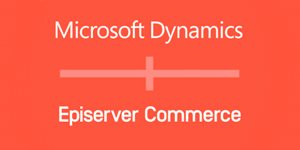Episerver Commerce for Microsoft Dynamics 365
When my co-worker Laura Myers and I attended Episerver Ascend 2017, alongside Epi  customers, Ektron customers, and Episerver’s leadership, we also interviewed some technology partners, and one of them was Nir Mashkowski, Partner Director Program Management – Azure App Service and Azure Functions at Microsoft. During our conversation, he told us that Microsoft has been a partner with Episerver for five years and during the annual event in Las Vegas, both vendors discussed how to expand their long-standing partnership.
customers, Ektron customers, and Episerver’s leadership, we also interviewed some technology partners, and one of them was Nir Mashkowski, Partner Director Program Management – Azure App Service and Azure Functions at Microsoft. During our conversation, he told us that Microsoft has been a partner with Episerver for five years and during the annual event in Las Vegas, both vendors discussed how to expand their long-standing partnership.
Those discussions came to fruition late last week as Episerver announced the release of Episerver Commerce for Microsoft Dynamics 365. Following the announcement, we reached out to Episerver’s Senior Director of Commerce, Ed Kennedy to discuss the reasoning behind the  integration and the benefits it brings to Episerver customers, and he said: “With the number of customer touchpoints growing larger every day, e-commerce has become an increasingly complex operation. Whether you’re on the B2C side or the B2B side, customers expect to browse and buy within and between any channel. This requires firms to synchronize their experiences, customer data, product data, inventory records, prices and promotions between web, mobile app and physical locations. Our launch of Episerver Commerce for Microsoft Dynamics 365 shortens the time it takes to synchronize these channels by providing a set of data connectors between Episerver Commerce and Microsoft Dynamics CRM and ERP solutions, all of which can be deployed to a single cloud service in Microsoft Azure. Customers like Premier Designs, Jenson USA, and Bolia.com are now unifying their digital operations and digital experience strategies onto one common platform – Microsoft Azure, with Episerver.”
integration and the benefits it brings to Episerver customers, and he said: “With the number of customer touchpoints growing larger every day, e-commerce has become an increasingly complex operation. Whether you’re on the B2C side or the B2B side, customers expect to browse and buy within and between any channel. This requires firms to synchronize their experiences, customer data, product data, inventory records, prices and promotions between web, mobile app and physical locations. Our launch of Episerver Commerce for Microsoft Dynamics 365 shortens the time it takes to synchronize these channels by providing a set of data connectors between Episerver Commerce and Microsoft Dynamics CRM and ERP solutions, all of which can be deployed to a single cloud service in Microsoft Azure. Customers like Premier Designs, Jenson USA, and Bolia.com are now unifying their digital operations and digital experience strategies onto one common platform – Microsoft Azure, with Episerver.”
According to Episerver, the solution addresses the needs of modern retailers, manufacturers and distributors alike with complex, and growing omnichannel requirements, all while reducing “under-the-hood” implementation costs and expediting time to value. How exactly does the Microsoft integration benefit Episerver customers, you may ask? Here are some significant capabilities of Episerver Commerce with out-of-the box connectors to Microsoft’s ERP and CRM solutions:
-
Integrating data for orders, products, pricing, and promotions between Episerver Commerce and Microsoft Dynamics 365, AX, NAV, and LS Retail.
-
Sharing customer data between Episerver Commerce and Microsoft Dynamics CRM.
-
Using digital assets stored in Microsoft SharePoint on your e-commerce site.
-
Standardizing on the latest .NET framework.
- Deploying everything to the Microsoft Azure Cloud using Episerver Digital Experience Cloud as a PaaS.
“Episerver shares our vision of driving transformation and enhancing the customer experience, all with the power of digital intelligence”, said David Willis, Corporate Vice President, Microsoft. “Our solutions can help to take this vision further, by unifying the capabilities of CRM business software and ERP systems with Dynamics 365, and Episerver’s unified content and commerce platform - all on the Microsoft Azure cloud.”
An Enterprise-Class Commerce Platform
As you may recall, Episerver made its debut in Forrester’s B2B and B2C Commerce Suites Wave back in March, and it was the sole Microsoft .NET vendor that appeared in both the B2B and B2C Wave reports. Following this impressive recognition, I was fortunate enough to have a conversation with Episerver’s CMO James Norwood about the commerce market. During our conversation back in May, he made great points on the significant change in buyers’ perspective and the impact of this change on market research reports such as Forrester’s Wave: “In this omnichannel world, everybody today is trying to maintain this continuous and consistent level of engagement with customers across channels and to be as seamless as possible delivering the right message and the right offer at the right time. So the way to be able to differentiate and stay relevant is experience-driven commerce, which is really at the heart of what Episerver does.” Additionally, he stressed that many organizations are going through re-platforming because they are looking to do things differently. “We have our niche market and it’s rapidly growing as our customers want to be disruptive in the space and want to act like an enterprise company,” said James Norwood and added: “So our job is to help them differentiate the experience rather than through price and availability. That’s definitely a section we can support well and that’s where agility is very important too.”
back in March, and it was the sole Microsoft .NET vendor that appeared in both the B2B and B2C Wave reports. Following this impressive recognition, I was fortunate enough to have a conversation with Episerver’s CMO James Norwood about the commerce market. During our conversation back in May, he made great points on the significant change in buyers’ perspective and the impact of this change on market research reports such as Forrester’s Wave: “In this omnichannel world, everybody today is trying to maintain this continuous and consistent level of engagement with customers across channels and to be as seamless as possible delivering the right message and the right offer at the right time. So the way to be able to differentiate and stay relevant is experience-driven commerce, which is really at the heart of what Episerver does.” Additionally, he stressed that many organizations are going through re-platforming because they are looking to do things differently. “We have our niche market and it’s rapidly growing as our customers want to be disruptive in the space and want to act like an enterprise company,” said James Norwood and added: “So our job is to help them differentiate the experience rather than through price and availability. That’s definitely a section we can support well and that’s where agility is very important too.”
Considering Episerver received a whopping score on Total Cost of Ownership (TCO), which is at 5 out of 5 while the average is at 3.8 out of 5 in Forrester’s Wave, Episerver is committed to helping midsize businesses deliver to their customers an enterprise-level experience. With that goal in mind, Episerver Commerce with connectors to Microsoft’s ERP and CRM solutions is, therefore, designed to achieve lower costs, risks, and faster time-to-market.
Episerver Commerce and Microsoft Together in Action
To understand what Epi customers can really do with the integration between Episerver and Microsoft, let’s look at one of Episerver’s customers, Bolia’s story about how they boasted double-digit sales growth achieving $94 million in revenue after integrating Episerver with their Microsoft Dynamics AX solution, and deploying everything to the Azure cloud.
Bolia is a Scandinavian home decor and furniture brand and half of Bolia’s online revenue has been generated through its made-to-order purchases where consumers can design their own piece online and have it shipped to their home. As the nature of their business, delivering personalized experiences is their primary objective. However, considering the brand manages over 40 stores in 17 countries, creating extraordinary experiences at scale is a real challenge. To unify their digital and in-store experiences, the brand decided to utilize Episerver Digital Experience Cloud. According to Episerver, Bolia’s product descriptions are synchronized between Episerver and Microsoft Dynamics which helps customers design a made-to-order piece online. Once the design is done, with data from Microsoft Dynamics AX, the site provides the customer with the information on delivery dates, even before the piece is in the making.
has been generated through its made-to-order purchases where consumers can design their own piece online and have it shipped to their home. As the nature of their business, delivering personalized experiences is their primary objective. However, considering the brand manages over 40 stores in 17 countries, creating extraordinary experiences at scale is a real challenge. To unify their digital and in-store experiences, the brand decided to utilize Episerver Digital Experience Cloud. According to Episerver, Bolia’s product descriptions are synchronized between Episerver and Microsoft Dynamics which helps customers design a made-to-order piece online. Once the design is done, with data from Microsoft Dynamics AX, the site provides the customer with the information on delivery dates, even before the piece is in the making.
The brand's efforts in delivering extraordinary personalization are not limited to its made-to-order offering and also, if a customer leaves the store even without purchasing any item, the associate, who worked with them during their visit, sends a personalized offer via email. If the offer appeals to the customer, the transition can be completed online. According to the brand, these post-visit offers are accounted for 29 percent of its online revenue. According to Episerver, its Digital Experience Cloud enabled the brand to utilize the website as their in-store point-of-sale system to place orders for customers including scheduling delivery of made-to-order products to the customer's home.
Speaking of customer success stories, “Jenson USA does the majority of our business online, which makes the customer experience vital in all channels,” said Jeff Bolkovatz, director of IT, Jenson USA in the press release. “We chose Episerver Commerce for Dynamics 365 for its ability to optimize conversions, while delivering an integrated digital experience platform that makes it possible for us to empower our employees to focus more on the customer journey as opposed to deployment and integration concerns.”
My POV
Separation of channels often leaves customers frustrated and confused. Considering that today, 91% of customers want to pick up where they left off from one channel to the next, disconnection between departments and channels are not something today’s consumer really wants to tolerate and especially millennials are not really known for their high tolerance. Therefore, it is imperative for businesses to have a holistic approach when they employ a technology and strategy. With this in mind, one thing is certain, that Episerver Commerce for Dynamics 365 will make it easier to manage omnichannel efforts for the joint customers.
With a clear, strong go-to-market roadmap and a strong commitment to keeping up with the emerging technologies such as artificial intelligence and machine learning, the vendor doesn’t seem to be slowing its significant investments in social commerce and machine learning-based personalization technology anytime soon.

Venus Tamturk
Venus is the Media Reporter for CMS-Connected, with one of her tasks to write thorough articles by creating the most up-to-date and engaging content using B2B digital marketing. She enjoys increasing brand equity and conversion through the strategic use of social media channels and integrated media marketing plans.